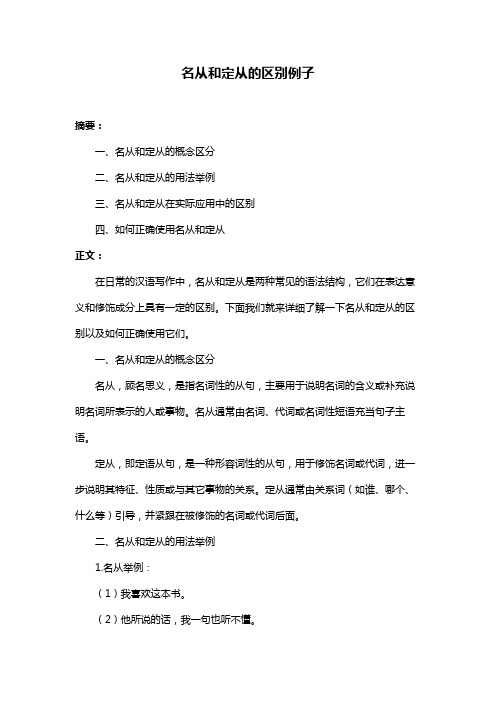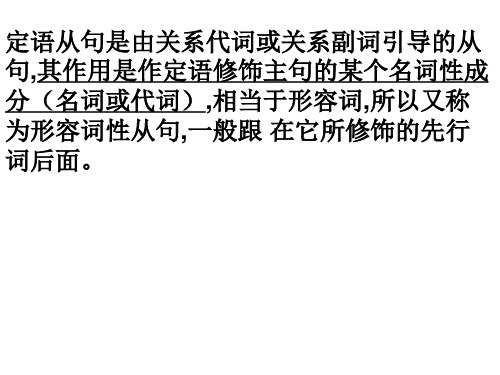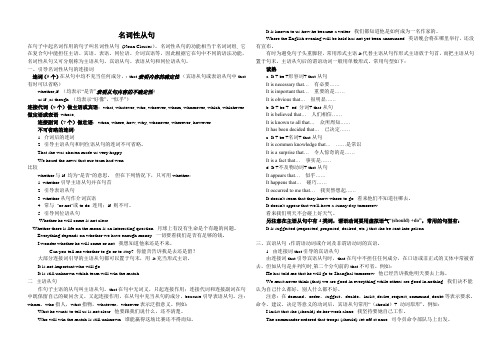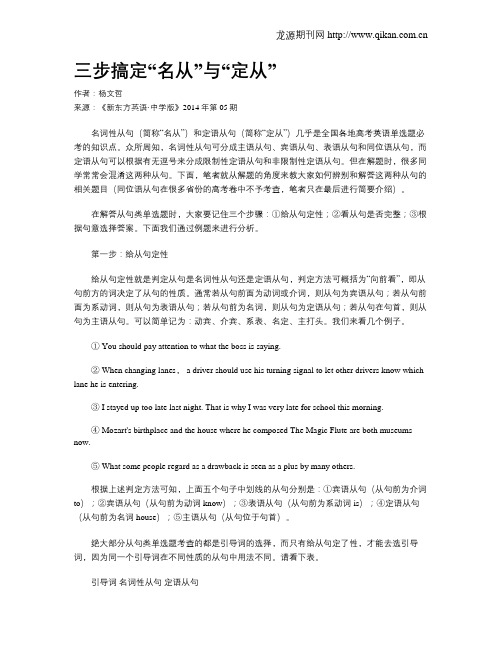最新名从和定从的区别
名从和定从的区别例子

名从和定从的区别例子摘要:一、名从和定从的概念区分二、名从和定从的用法举例三、名从和定从在实际应用中的区别四、如何正确使用名从和定从正文:在日常的汉语写作中,名从和定从是两种常见的语法结构,它们在表达意义和修饰成分上具有一定的区别。
下面我们就来详细了解一下名从和定从的区别以及如何正确使用它们。
一、名从和定从的概念区分名从,顾名思义,是指名词性的从句,主要用于说明名词的含义或补充说明名词所表示的人或事物。
名从通常由名词、代词或名词性短语充当句子主语。
定从,即定语从句,是一种形容词性的从句,用于修饰名词或代词,进一步说明其特征、性质或与其它事物的关系。
定从通常由关系词(如谁、哪个、什么等)引导,并紧跟在被修饰的名词或代词后面。
二、名从和定从的用法举例1.名从举例:(1)我喜欢这本书。
(2)他所说的话,我一句也听不懂。
2.定从举例:(1)我的好朋友,他昨天生日。
(2)那辆红色的汽车,是我哥的。
三、名从和定从在实际应用中的区别名从和定从在实际应用中的主要区别在于它们在句子中的功能和位置。
名从主要用来补充说明名词的含义,而定从则用来修饰名词,表示其特征或与其它事物的关系。
此外,名从通常位于被修饰名词之前,而定从则紧跟在被修饰名词之后。
四、如何正确使用名从和定从要正确使用名从和定从,首先要清楚它们在句子中的作用和位置。
在写作过程中,可以根据需要补充名词的含义或修饰名词,使句子更加完整和丰富。
同时,要注意区分不同类型的从句,避免在使用过程中出现混淆。
总之,名从和定从在汉语写作中起着重要作用,掌握它们的区别和使用方法,有助于提高写作水平。
高考英语语法定从,强调,,名词性从句

她考试及格的消息使她父母亲很高兴。(同位语从句)
此句中的同位语从句The news that she had passed the exam
可以改写成表语从句:The news is that he passed the exam.
Put back the book where it was.把书放回原处。(状语从句)
定语从句中的关系词在从句中充当某种句子成分,因此去掉它则从句成分不完整;而结果状语从句中的连接词在从句中不作任何成分,去掉后从句的成分仍然完整。
It is such an interesting book as we all like.它是我们大家都喜欢的如此有趣的书。
(as用作动词like的宾语,它引导的是定语从句)
It is such an interesting book that we all like it.
它是一本如此有趣的书,我们大家都喜欢它。
(that不充当句子成分,故它引导的是结果状语从句)
定语从句
与
同位语从句
定语从句在复合句中相当于形容词,对先行词起修饰、描述或限制的作用,与先行词之间有从属关系。同位语的作用相当于名词,对前面的名词给予补充说明或进一步解释,是前面名词的具体内容,与先行词之间是同位关系。
②Mr Li has three daughters,but none of _____ is a dancer.
从结构上看,①小题是定语从句,故填whom;
②小题有并列连词but,是并列句,故填代词them。
定语从句
与
状语从句
定从和名从

when(=in/on/at…which) , where(=in/on/at…which), why(=for which)。
特殊情况: that/in which/- he worked 1. This is the way_______________ out the problem.
在定语从句中作方式状语的用法,通常是the way+ in which 或that, 且口语中的in which/that常可省略。
(3) 连 接 代 词 有 what, which, who, whom, whose, whatever, whoever, whomever, whichever 等。它们有各自的含义,起连接作用,并在从 句中充当主语、表语、宾语、定语等,不省略。 (4)连接副词有how, when, where, however, whenever, wherever。它们有各自的含义,起连 接作用,在从句中充当状语,不省略。
二 1.who 2.why 3.that 4.whether/if 5.whether/if 6.that 7.whether/if 8.what 9.Why 10.how
三 1.what we can do to grow up happily and healthily 2.that attitude decides everything 3.that we can adapt to changes and enjoy life better 4.that we should make some good friends 5.that so long as we do all the things above well
whom 2. The woman with __________ you shook hands just now is the head of the company. which I referred in my talk. This is the car to ______
名从和定从的区别

sth.
prep. + which
The Relative Clause
She still remembers the days ___b__ she spent in the countryside.
a. while b. that c. when d. where
Do you know the year __a___ The
Revision
The Relative Clause &
The Noun Clause
who, whom, whose, what, how, which, that, if, where, when, why, whether, etc.
who, whom, whose,
which, that, where, when,
a lion.
a. at which
b. which
in which
c. where
d. for which
The Relative Clause
Teachers should create an environment __a___
children are taught how to solve problems of learning biny wthheimchselves.
The chief foods eaten in any country depend
largely on ___a__ grows best in its climate and
soil.
宾语从句
a. what b. which c. why d. where
-- I drove to Zhuhai for the air show last week.
名从、定从、时态、非谓语

名词性从句在句子中起名词作用的句子叫名词性从句(Noun Clauses)。
名词性从句的功能相当于名词词组, 它在复合句中能担任主语、宾语、表语、同位语、介词宾语等,因此根据它在句中不同的语法功能,名词性从句又可分别称为主语从句、宾语从句、表语从句和同位语从句。
一、引导名词性从句的连接词连词(5个)在从句中均不充当任何成分,:that表明内容的确定性(宾语从句或表语从句中that 有时可以省略)whether,if (均表示“是否”表明从句内容的不确定性)as if ,as though (均表示“好像”,“似乎”)连接代词(9个)做主语或宾语:what, whatever, who, whoever, whom, whomever, which, whichever 做定语或表语whose,连接副词(7个)做壮语:when, where, how, why, whenever, wherever, however不可省略的连词:1. 介词后的连词2. 引导主语从句和同位语从句的连词不可省略。
That she was chosen made us very happy.We heard the news that our team had won.比较whether与if 均为"是否"的意思。
但在下列情况下,只可用whether:1. whether引导主语从句并在句首2. 引导表语从句3. whether从句作介词宾语4. 常与"or not"或to do 连用;if 则不可。
5. 引导同位语从句Whether he will come is not clear.Whether there is life on the moon is an interesting question. 月球上有没有生命是个有趣的问题。
Everything depends on whether we have enough money. 一切要看我们是否有足够的钱。
高考综合复习:高考透析“名从”和“定从”

高考综合复习:高考透析“名从”和“定从”审稿:白雪雁责编:张敏名词性从句考点透析1.that无词义,在从句中不做成分。
当that引导主语从句、表语从句、同位语从句时,that不能省。
(1)That he will refuse the offer is impossible.(2)It worried her a bit that her hair was turning grey.2.whether,if都可引导名词性从句,但需注意下列几点:(1)在句首引导主语从句时,只能用whetherWhether we'll go camping tomorrow depends on the weather.(2)if不能引导表语从句What the doctor really doubt is whether my mother will recover from the serious disease soon.(3)if不能引导介词后的宾语从句Everything depends on whether we can make a plan that they will agree to.(4)如果宾语从句是否定句时,只能用ifI asked Pave if he hadn't decided what he would say at the meeting.(5)discuss后的宾语从句只能用whether引导。
doubt作“怀疑”解、后接宾语从句时,如果主句是肯定的,宾语从句用whether或if引导,如果主句是否定的,宾语从句只能用that引导。
①We discussed whether the medicine will cause side effect.(我们讨论了这种药是否会引起负作用。
)②I doubt whether/if he is fit for his office.③I don't doubt that he can do it very well.3.wh~词既有词义(该词基本的词汇意义),又在名词性从句中充当成分,因此,在选择wh~词时,既要考虑该词的基本意义,又要考虑它在从句中的作用。
宾语从句和定语从句的区别

宾语从句和定语从句的区别最简单的方法就是把从句去掉。
如果句子结构依然成立,那么从句就是定语从句。
如果句子缺少成份了,那么就是宾语从句了。
另外,就位置来说,宾语从句一定放在及物动词或介词后面,要特别注意带形式宾语It的情况。
定语从句一定在名词后面。
至于那些关联词,我的方法是分类记忆。
that,Which属于定从的关系代词,在从句中充当一定成分,指代先行词;when,Why属于关系副词,无论定从还是宾从都不充当任何成分。
what是宾从中的关系代词,充当成分。
that还有一个作用就是宾从的关系副词,不充当任何成分。
一、位置的不同:宾语位于及物动词或介词后面;定语从句位于名词后修饰名词;二、引导词的不同:宾语从句引导词有三种:连词,连接代词,连接副词;而定语从句引导词有两种:关系代词,关系副词。
三、意义的不同:宾语从句是宾语,句子中的不可缺少的成分,不能用逗号与句子隔开;定语从句是修饰用的,可以用逗号与句子隔开,成为非限制性定语从句。
二、一、位置的不同:宾语位于及物动词或介词后面;定语从句位于名词后修饰名词;二、引导词的不同:宾语从句引导词有三种:连词,连接代词,连接副词;而定语从句引导词有两种:关系代词,关系副词。
三、意义的不同:宾语从句是宾语,句子中的不可缺少的成分,不能用逗号与句子隔开;定语从句是修饰用的,可以用逗号与句子隔开,成为非限制性定语从句。
宾语从句(一)宾语从句在复合句中作主句的宾语。
宾语从句常由that引导,在口语中常省略。
当主句中谓语动词是现在或将来时态时,从句中谓语动词不受主句中谓语动词时态的影响,按需要可以使用任何时态。
如:She says (that) she works from Monday to Friday. 她说她从周一至周五上班。
(从句是一般现在时)She says (that) she will leave a message on his desk. 她说她要在他桌子上留个便条。
三步搞定“名从”与“定从”

三步搞定“名从”与“定从”作者:杨文哲来源:《新东方英语·中学版》2014年第05期名词性从句(简称“名从”)和定语从句(简称“定从”)几乎是全国各地高考英语单选题必考的知识点。
众所周知,名词性从句可分成主语从句、宾语从句、表语从句和同位语从句,而定语从句可以根据有无逗号来分成限制性定语从句和非限制性定语从句。
但在解题时,很多同学常常会混淆这两种从句。
下面,笔者就从解题的角度来教大家如何辨别和解答这两种从句的相关题目(同位语从句在很多省份的高考卷中不予考查,笔者只在最后进行简要介绍)。
在解答从句类单选题时,大家要记住三个步骤:①给从句定性;②看从句是否完整;③根据句意选择答案。
下面我们通过例题来进行分析。
第一步:给从句定性给从句定性就是判定从句是名词性从句还是定语从句,判定方法可概括为“向前看”,即从句前方的词决定了从句的性质。
通常若从句前面为动词或介词,则从句为宾语从句;若从句前面为系动词,则从句为表语从句;若从句前为名词,则从句为定语从句;若从句在句首,则从句为主语从句。
可以简单记为:动宾、介宾、系表、名定、主打头。
我们来看几个例子。
① You should pay attention to what the boss is saying.② When changing lanes, a driver should use his turning signal to let other drivers know which lane he is entering.③ I stayed up too late last night. That is why I was very late for school this morning.④ Mozart's birthplace and the house where he composed The Magic Flute are both museums now.⑤ What some people regard as a drawback is seen as a plus by many others.根据上述判定方法可知,上面五个句子中划线的从句分别是:①宾语从句(从句前为介词to);②宾语从句(从句前为动词know);③表语从句(从句前为系动词is);④定语从句(从句前为名词house);⑤主语从句(从句位于句首)。
- 1、下载文档前请自行甄别文档内容的完整性,平台不提供额外的编辑、内容补充、找答案等附加服务。
- 2、"仅部分预览"的文档,不可在线预览部分如存在完整性等问题,可反馈申请退款(可完整预览的文档不适用该条件!)。
- 3、如文档侵犯您的权益,请联系客服反馈,我们会尽快为您处理(人工客服工作时间:9:00-18:30)。
主 语
●
●●
宾 语
●
●
●●
定 语
●
状 语
●
●●
The Noun Clause
The chief foods eaten in any country depend
largely on ___a__ grows best in its climate and
soil.
宾语从句
a. what b. which c. why d. where
同位语从句
a. that b. what c. why d. whether
The Noun Clause
that if whether who whom whose
主语
●
宾语
●
●
表语
●
定语
●
状语
无成分 ● ●
●
The Noun Clause
which what when where why how
flow of carbon dioxide in and out the atmosphere
today.
主语从句
a. that b. when c. what d. how
__a___ it will do us good or harm remains tohat c. How d. That
主语
●
宾语
●
表语
●
定语 ● 状语 无成分
●
●
●●
Error - correction
The problem that the material can be used in our factory has not been solved. whether
What fashion differs from country to country may reflect the cultural differences from one aspect. That
_u_n_d_e_r_r_e_p_a_ir___. 爱因斯坦最著名的是我们称之为相对论的理论。
(what) Einstein’s most famous theory is _w_h_a_t_w_e__c_a_ll__ __th_e__T_h_e_o_ry__o_f _R_e_la_t_iv_i_ty__.
That is the reason which he gave us for carrying out the plan.
We have to consider what to do in situations which there are many people involved. where
-- I drove to Zhuhai for the air show last week.
-- Is that __a___ you had a few days off?
a. why b. when c. what d. where 表语从句
The Noun Clause
It is pretty well understood __c___ controls the
Translation
他突然想到可以用另一种方法来做这个试验。(way) An idea occurred to him __t_h_a_t _h_e_m__ig_h_t_d_o__th_e___ _e_x_p_e_ri_m_e_n_t_i_n_a_n_o_t_h_e_r _w_a_y_.
别太靠近那幢房子,它的屋顶正在维修。(whose) Don’t get too close to the house _w_h_o_s_e_r_o_o_f_is__
that, if, where, when,
why, whether, etc.
Connectives used in the Relative Clause
Connectives used in the Noun Clause
The Relative Clause
who whom whose which that where when why
名从和定从的区别
who, whom, whose, what, how, which, that, if, where, when, why, whether, etc.
who, whom, whose,
which, that, where, when,
why, etc.
who, whom, whose, what, how, which,
Translation
他没有通过驾驶考试的原因是缺乏实践。(lack) The reason why he didn’t pass the driving test was that he lacked practice.
书店里关于年轻妈妈如何养育幼儿的书很畅销。 (sell) In the bookstore, the books on how young mothers breed babies sell well.
The Relative Clause & the Appositive Clause
The news __a___ he told me is really
encouraging.
定语从句
The news __a___ our team has won the game is
really encouraging.
Homework
Finish the exercise paper on the Relative Clause and the Noun Clause.
